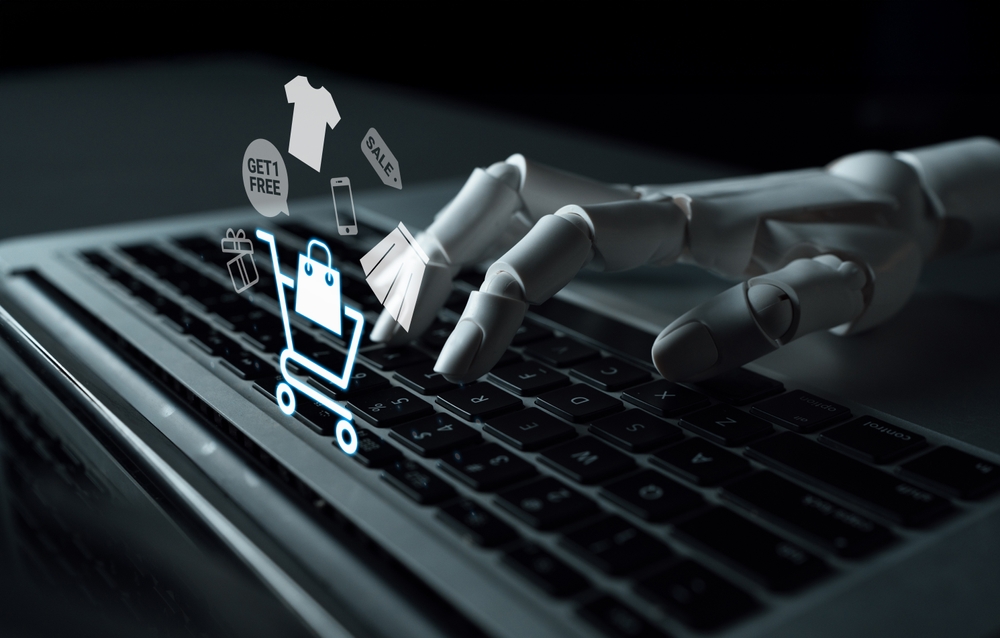By Stephen DeAngelis
Inflation is starting to impact the retail sector in significant ways. Some experts believe artificial intelligence (AI) capabilities will help retailers find their way through these volatile times. Even if inflation wasn’t an issue, Richard Kestenbaum (@RKestenbaum), Co-founder and Partner at Triangle Capital LLC, insists, “Artificial intelligence will be important at every level of retail.”[1] According to Kestenbaum, some retailers don’t understand AI’s importance to their success. He indicates “their eyes glaze over” when he raises the topic and that “very few people want to talk about it.” This bury-your-head-in-the-sand approach won’t make things any better for retailers. Kestenbaum explains, “[AI is] coming, it’s unavoidable. AI is going to pervade almost every aspect of retail, big and small.”
One reason Kestenbaum is so insistent that AI has a crucial role to play in retail is that sustainability is becoming more important to every business. He reports that a company called COI Energy Services can install AI-powered software that can save a 50,000-square-feet supermarket $60,000 on their annual electric and gas costs. Publix is doing just that. He notes, “You could keep ignoring the potential of AI or you could do what Publix is doing and save the money.” Of course, cognitive technologies can do more than monitor and control energy usage. Kestenbaum points out that AI platforms can also help brands make important decisions. In today’s retail world, he notes, there are numerous variables that can affect decision-making. He insists, “There are literally billions of possible decisions that are possible and they get adjusted too often for any human being to manage. Until now, decision-makers relied on their instincts or ‘gut’ and while some people are gifted at brand management, most people aren’t. That’s why AI can help and competing against a brand managed with the help of artificial intelligence is more than anyone could handle. Everyone is going to have to do this.”
The AI Imperative
The staff at Daisy Intelligence believes retailers have awakened to the benefits of AI. They observe, “Whether AI or advanced analytics, North American merchant organizations are stepping up their investment in new technologies, which is driving the retail industry to near full adoption. According to a survey conducted by the Research Management Group (RMG) in 2020, approximately 78 percent of the industry will have adopted AI and 89 percent will have adopted advanced analytics within the next three years.”[2] Like Kestenbaum, they insist implementing AI solutions is essential for future success. They explain, “To compete in the complex, competitive and changing retail environment today, adopting these technologies is no longer optional, rather it is essential for long-term survival.” And, like Kestenbaum, they see decision-making as AI’s most significant contribution. They explain that AI can be used “to optimize and make millions of decisions on items, price points, channel types and timing. … In fact, according to the 2020 survey conducted by RMG, 25 percent of retail executives reported that AI enables better decision-making and insights, which can be attributed to its ability to consider the entirety of a business.”
Machine learning expert Rayan Potter reports, “A published study predicted that by the year 2023, the retail sector would typically spend $12 billion on AI. There realistically are several possible reasons for this, but majorly it is because this advanced technology helps in progressively improving productivity while decreasing operational expenses.” Journalist John McCormick (@McCormickJohn) reports a study by International Data Corporation (IDC) found, “Retail is poised to overtake banking as the top spender on artificial intelligence as companies including Home Depot Inc. and Wayfair Inc. turn to the technology for a wider range of operations, from inventory management to more personalized online search and shopping.”[4] Jeremy King, Pinterest Inc.’s Senior Vice President of engineering, told McCormick, “Everything you can think of in almost every part of retail is being powered by AI.”
Benefits of AI in Retail
Potter suggests seven specific ways AI can be useful to retailers. They are:
1. Understanding and Predicting Consumer Behavior. Potter notes, “Knowing and predicting consumer behavior/demand across interconnected supply chains is more important than ever. … For example, Amazon uses a recommendation engine and made 35% of its income through it.” Retailers can take advantage of AI solutions, like the Enterra Shopper Marketing and Consumer Insights Intelligence System™, to understand how consumer behavior is changing.
2. Reducing Wait-Time at Counters. According to Potter, “Using artificial intelligence in automated self-checkout systems has been the most inventive upgrade to existing self-checkout processes. AI-enabled solutions will not only make transactions faster but also dissuade fraud.”
3. Availability of Virtual Trials. The metaverse is an area into which retailers are starting to move. Potter reports, “Virtual trial rooms help clients reduce time, money, and travel expenditures by allowing them to select genuine products in just a few minutes from anywhere.”
4. Inventory Optimization. Keeping track of inventory in the modern omnichannel era can be a challenge. AI can help. It can be used to track and locate inventory. It can also be used to help maintain proper inventory levels. Potter explains that AI can use warehouse location data, seasonal data, and other variables to adjust quantities of optimal stock.
5. Logistics, Transportation, and Delivery Management. One of the first uses of AI in the supply chain was process optimization. Potter notes, “The way the retail business handles logistics and transportation has already been altered by AI. Self-driving cars, robot delivery, intelligent route planning, and drones are just a few of AI’s fascinating new advances.”
6. Store Layout Management. Retailers have been using planograms for decades. AI puts a new twist on their use. Potter notes, “Retailers can improve retail shop design and layout with AI. AI can assist to customize the layout of retail establishments in order to increase consumer happiness and sales.”
7. Media Optimization. Over a century ago, John Wanamaker, the late department store magnate, lamented, “Half the money I spend on advertising is wasted. The trouble is I don’t know which half.” AI is helping change that situation. Potter explains, “Retailers’ engagement with digital media is growing because of AI. AI is assisting the retailers to execute campaigns on both paid and free media outlets, such as YouTube, Facebook, and Google.”
Concluding Thoughts
The Daisy Intelligence staff concludes, “The data doesn’t lie. The adoption of new technologies has resulted in a transformation of the retail industry. What’s more, the implementation of these technologies is undeniably improving retail organizations, making them more efficient and profitable. Though implementation can be both daunting and challenging, it continues to remain necessary, not optional, to keep pace in the current environment.” Kestenbaum agrees. He concludes, “It’s time for everyone else to leap over their hesitation and embrace what’s coming. If artificial intelligence is relevant to both brand management and the temperature of a freezer in a supermarket, then it will eventually be ubiquitous at every retailer.”
Footnotes
[1] Richard Kestenbaum, “Like It Or Not, Artificial Intelligence Is Coming To Every Part Of Retail,” Forbes, 8 November 2021.
[2] Daisy Intelligence, “Adoption Of AI And Advanced Analytics In Retail Operations,” The Shelby Report, 4 August 2021.
[3] Rayan Potter, “Power of AI In the Retail Sector,” Datafloq, 12 July 2021.
[4] John McCormick, “Retail Set to Overtake Banking in AI Spending,” The Wall Street Journal, 7 September 2021.








